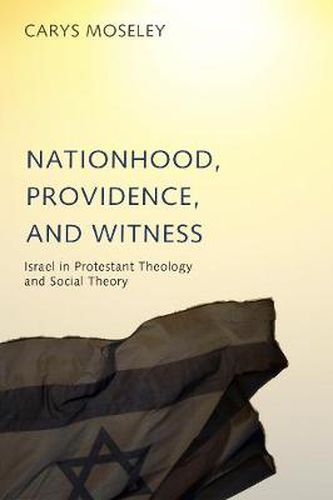Readings Newsletter
Become a Readings Member to make your shopping experience even easier.
Sign in or sign up for free!
You’re not far away from qualifying for FREE standard shipping within Australia
You’ve qualified for FREE standard shipping within Australia
The cart is loading…






This title is printed to order. This book may have been self-published. If so, we cannot guarantee the quality of the content. In the main most books will have gone through the editing process however some may not. We therefore suggest that you be aware of this before ordering this book. If in doubt check either the author or publisher’s details as we are unable to accept any returns unless they are faulty. Please contact us if you have any questions.
This book argues that problems with recognizing the State of Israel lie at the heart of approaches to nationhood and unease over nationalism in modern Protestant theology, as well as modern social theory. Three interrelated themes are explored. The first is the connection between a theologian’s attitude to recognizing Israel and their approach to the providential place of nations in the divine economy. Following from this, the argument is made that theologians’ handling of both modern and ancient Israel is mirrored profoundly in the question of recognition and ethical treatment of the nations to which they belong, along with neighboring nations. The third theme is how social theory, represented by certain key figures, has handled the same issues. Four major theologians are discussed: Reinhold Niebuhr, Rowan Williams, John Milbank, and Karl Barth. Alongside them are placed social theorists and scholars of religion and nationalism, including Mark Juergensmeyer, Philip Jenkins, Anthony Smith, and Adrian Hastings. In the process, debates over the relationship between theology and social theory are reconfigured in concrete terms around the challenge of recognition of the State of Israel as well as stateless nations.
$9.00 standard shipping within Australia
FREE standard shipping within Australia for orders over $100.00
Express & International shipping calculated at checkout
This title is printed to order. This book may have been self-published. If so, we cannot guarantee the quality of the content. In the main most books will have gone through the editing process however some may not. We therefore suggest that you be aware of this before ordering this book. If in doubt check either the author or publisher’s details as we are unable to accept any returns unless they are faulty. Please contact us if you have any questions.
This book argues that problems with recognizing the State of Israel lie at the heart of approaches to nationhood and unease over nationalism in modern Protestant theology, as well as modern social theory. Three interrelated themes are explored. The first is the connection between a theologian’s attitude to recognizing Israel and their approach to the providential place of nations in the divine economy. Following from this, the argument is made that theologians’ handling of both modern and ancient Israel is mirrored profoundly in the question of recognition and ethical treatment of the nations to which they belong, along with neighboring nations. The third theme is how social theory, represented by certain key figures, has handled the same issues. Four major theologians are discussed: Reinhold Niebuhr, Rowan Williams, John Milbank, and Karl Barth. Alongside them are placed social theorists and scholars of religion and nationalism, including Mark Juergensmeyer, Philip Jenkins, Anthony Smith, and Adrian Hastings. In the process, debates over the relationship between theology and social theory are reconfigured in concrete terms around the challenge of recognition of the State of Israel as well as stateless nations.